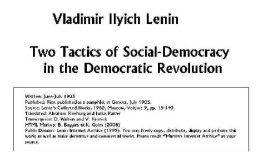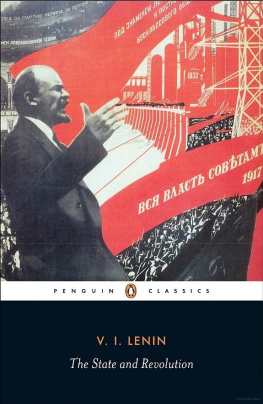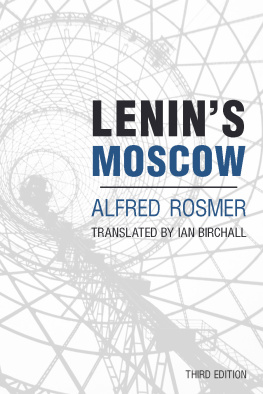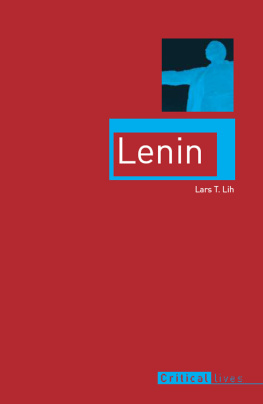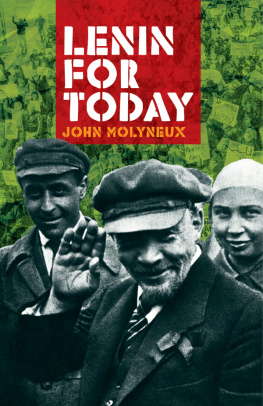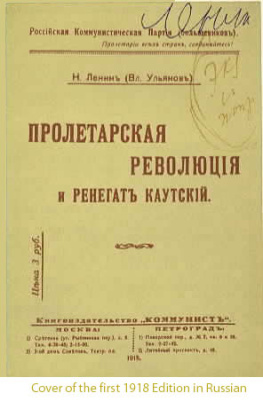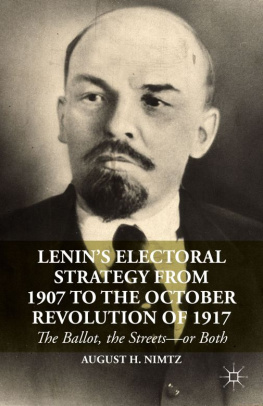Vladimir Ilyich Lenin - Two Tactics of Social-Democracy in the Democratic Revolution - Lenin
Here you can read online Vladimir Ilyich Lenin - Two Tactics of Social-Democracy in the Democratic Revolution - Lenin full text of the book (entire story) in english for free. Download pdf and epub, get meaning, cover and reviews about this ebook. genre: Politics. Description of the work, (preface) as well as reviews are available. Best literature library LitArk.com created for fans of good reading and offers a wide selection of genres:
Romance novel
Science fiction
Adventure
Detective
Science
History
Home and family
Prose
Art
Politics
Computer
Non-fiction
Religion
Business
Children
Humor
Choose a favorite category and find really read worthwhile books. Enjoy immersion in the world of imagination, feel the emotions of the characters or learn something new for yourself, make an fascinating discovery.
- Book:Two Tactics of Social-Democracy in the Democratic Revolution - Lenin
- Author:
- Genre:
- Rating:4 / 5
- Favourites:Add to favourites
- Your mark:
- 80
- 1
- 2
- 3
- 4
- 5
Two Tactics of Social-Democracy in the Democratic Revolution - Lenin: summary, description and annotation
We offer to read an annotation, description, summary or preface (depends on what the author of the book "Two Tactics of Social-Democracy in the Democratic Revolution - Lenin" wrote himself). If you haven't found the necessary information about the book — write in the comments, we will try to find it.
Vladimir Ilyich Lenin: author's other books
Who wrote Two Tactics of Social-Democracy in the Democratic Revolution - Lenin? Find out the surname, the name of the author of the book and a list of all author's works by series.
Two Tactics of Social-Democracy in the Democratic Revolution - Lenin — read online for free the complete book (whole text) full work
Below is the text of the book, divided by pages. System saving the place of the last page read, allows you to conveniently read the book "Two Tactics of Social-Democracy in the Democratic Revolution - Lenin" online for free, without having to search again every time where you left off. Put a bookmark, and you can go to the page where you finished reading at any time.
Font size:
Interval:
Bookmark:
.................................................
..................
In a revolutionary period it is very difficult to keep abreast of events, which provide an astonishing amount of new material for an evaluation of the tactical slogans of revolutionary parties. The present pamphlet was written before the Odessa events. that these events have forced even those Social-Democrats who created the uprising-as-a-process theory and who rejected propaganda for a provisional revolutionary government actually to pass over, or begin to pass over, to the side of their opponents. Revolution undoubtedly teaches with a rapidity and thoroughness which appear incredible in peaceful periods of political development. And, what is particularly important, it teaches not only the leaders, but the masses as well.
There is not the slightest doubt that the revolution will teach social-democratism to the masses of the workers in Russia. The revolution will confirm the program and tactics of Social-Democracy in actual practice, by demonstrating the true nature of the various classes of society, by demonstrating the bourgeois character of our democracy and the real aspirations of the peasantry, who, while being revolutionary in the bourgeois-democratic sense, harbour not the idea of socialisation, but of a new class struggle between the peasant bourgeoisie and the rural proletariat. The old illusions of the old Narodism, which are so clearly visible, for instance, in the draft programme of the Socialist-Revolutionary Party on the question of the development of capitalism in Russia, the question of the democratic character of our society and the question of the significance of a complete victory of a peasant uprisingall these illusions will be mercilessly and completely blown to the winds by the revolution. For the first time it will give the various classes their real political baptism. These classes will emerge from the revolution with a definite political physiognomy, for they will have revealed themselves, not only in the programs and tactical slogans of their ideologists, but also in the open political action of the masses.
Undoubtedly, the revolution will teach us, and will teach the masses of the people. But the question that now confronts a militant political party is: shall we be able to teach the revolution anything? shall we be able to make use of the correctness of our Social-Democratic doctrine, of our bond with the only thoroughly revolutionary class, the proletariat, to put a proletarian imprint on the revolution, to carry the revolution to a real and decisive victory, not in word but indeed, and to paralyse the instability, half-heartedness and treachery of the democratic bourgeoisie?
It is to this end that we must direct all our efforts, and the achievement of it will depend, on the one hand, on the accuracy of our appraisal of the political situation, on the correctness of our tactical slogans, and, on the other hand, on whether these slogans will be backed by the real fighting strength of the masses of the workers. All the usual, regular, current work of all the organisations and groups of our Party, the work of propaganda, agitation and organisation, is directed towards strengthening and expanding the ties with the masses. This work is always necessary; but in a revolutionary period less than in any other can it be considered sufficient. At such a time the working class feels an instinctive urge for open revolutionary action, and we must learn to set the aims of this action correctly, and then make these aims as widely known and understood as possible. It must not be forgotten that the current pessimism about our ties with the masses very often serves as a screen for bourgeois ideas regarding the role of the proletariat in the revolution. Undoubtedly, we still have a great deal to do to educate and organise the working class; but the whole question now is: where should the main political emphasis in this work of education and of organisation be placed? On the trade unions and legally existing societies, or on armed insurrection, on the work of creating a revolutionary army and a revolutionary government? Both serve to educate and organise the working class. Both are, of course, necessary. But the whole question now, in the present revolution, amounts to this: what is to be emphasised in the work of educating and organising the working class, the former or the latter?
The outcome of the revolution depends on whether the working class will play the part of a subsidiary to the bourgeoisie, a subsidiary that is powerful in the force of its onslaught against the autocracy but impotent politically, or whether it will play the part of leader of the peoples revolution. The more intelligent representatives of the bourgeoisie are perfectly aware of this. That is precisely why the , Economism in Social-Democracy, the trend, which is now placing the trade unions and the legally existing societies in the forefront. That is precisely why Mr. Struve welcomes (in the Osvobozhdeniye, No. 72) the Akimovist trends in the principles of the new Iskra. That is why he comes down so heavily on the detested revolutionary narrowness of the decisions of the Third Congress of the Russian Social-Democratic Labour Party.
It is exceptionally important at the present time for Social-Democracy to have correct tactical slogans for leading the masses. There is nothing more dangerous in a revolutionary period than belittling the importance of tactical slogans that are sound in principle. For example, the [Menshevik] we have the most precise, most carefully thought-out, and most complete expression of tactical viewsviews not casually expressed by individual writers, but accepted by the responsible representatives of the Social-Democratic proletariat. Our Party is in advance of all the others, for it has a precise program, accepted by all. It must also set the other parties an example of strict adherence to its tactical resolutions, in contradistinction to the opportunism of the democratic bourgeoisie of the Osvobozhdeniye and the revolutionary phrase-mongering of the Socialist-Revolutionaries, who only during the revolution suddenly thought of coming for ward with a draft of a program and of investigating for the first time whether it is a bourgeois revolution that is going on in front of their eyes.
That is why we think it a most urgent task of the revolutionary Social-Democrats to study carefully the tactical resolutions of the Third Congress of the Russian Social-Democratic Labour Party and of the Conference, to define what deviations there are in them from the principles of Marxism, and to get a clear understanding of the concrete tasks of the Social-Democratic proletariat in a democratic revolution. It is to this task that the present pamphlet is devoted. The testing of our tactics from the standpoint of the principles of Marxism and of the lessons of the revolution is also necessary for those who really desire to pave the way for unity of tactics as a basis for the future complete unity of the whole Russian Social-Democratic Labour Party, and not to confine themselves solely to verbal admonitions.
N. Lenin
July 1905
(Authors note to the 1907 edition.Ed.) Lenin
See p. 148 of this volume.Ed.Lenin
The Third Congress of the Russian Social-Democratic Labour Party (held in London in May 1905) was attended only by Bolsheviks, while in the Conference (held in Geneva at the same time) only Mensheviks participated. In the present pamphlet the latter are frequently referred to as new
Font size:
Interval:
Bookmark:
Similar books «Two Tactics of Social-Democracy in the Democratic Revolution - Lenin»
Look at similar books to Two Tactics of Social-Democracy in the Democratic Revolution - Lenin. We have selected literature similar in name and meaning in the hope of providing readers with more options to find new, interesting, not yet read works.
Discussion, reviews of the book Two Tactics of Social-Democracy in the Democratic Revolution - Lenin and just readers' own opinions. Leave your comments, write what you think about the work, its meaning or the main characters. Specify what exactly you liked and what you didn't like, and why you think so.

